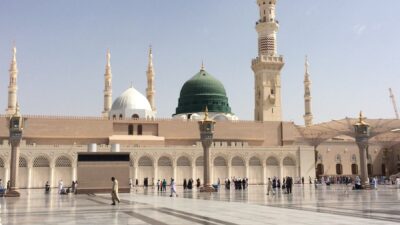In this article we examine the spread of fitnah against Uthman throughout the provinces. We highlight the pivotal role played by Abdullah ibn Saba.
Abdullah ibn Saba spreads fitnah throughout the provinces
Abdullah ibn Saba settled in Madina to delve into the affairs of the Muslims and to study their weak points. In 33AH he heard that an individual in Baṣra called Hakam bin Jabalah had been temporarily imprisoned for criminal activities. Ibn Saba travelled to Baṣra and befriended ibn Jabalah. Together they started a propaganda campaign against the governor and the Caliph. He also started propagating false beliefs such as the divine right of ‘Alī to be the Caliph. His display of love for ‘Alī was expressed so eloquently that soon a party in support of ‘Alī was formed. Differences between Arabs and non-Arabs, between Umayyads and Hashimites, between Bedouins and city dwellers were exploited. In the same year, the governor expelled him from Bas̩ra and he left for Kūfa. However he left behind a following on Baṣra. In Kūfa, Ibn Saba found fertile ground for his activities. Mālik ibn Ashtar was already working against the governor and the Caliph, and they jointly carried out propaganda against the Caliph.
Mālik ibn Ashtar and his co-conspirators were expelled from Kūfa for their anti –government activities. They were detained in Sham by Abdur Rahmān ibn Khalid bin Walīd. Ashtar repented and was sent to Medina to see Uthman. He accepted their repentance and allowed him to return to Kūfa. After his expulsion from Kūfa, Ibn Saba travelled to Syria, where he tried to win Abū Dharr to his cause. Abū Dharr had a dispute with Mu’āwiyah regarding the Baytul Māl, which Ibn Saba tried unsuccessfully to exploit. He left Damascus and travelled to Egypt.
Egypt
In Egypt, there was already discontent against the governor Abdullah ibn Sa’d. The latter was busy with the campaigns in North Africa and was not able to give the internal problems his immediate concern. In Egypt, Ibn Saba maintained letter contact with his supporters in Baṣra and Kūfa. A letter writing campaign was started as a result of which countless letters of complaints of alleged atrocities against the governors of Kūfa, Baṣra and Egypt, (and by implication against Uthman who appointed these governors) were arriving in Madina. The people of each region read those falsified letters to the people who were with them. They heard about the faults of governors in other provinces and they said: We are safe from the problems that Muslims are facing in that land, and they believed what they heard. In addition, forged letters were sent to these regions in the name of ‘Alī, Ṭalḥa and Zubair, complaining against Uthman. Many sincere but gullible people were led to belief that the leading Companions in Madina were against Uthman.
Uthman calls a meeting
In 34 AH, Uthman called a meeting of the governors in Madina after the Hajj to discuss the situation. Mu’āwiya from Syria, Abdullah bin Sa’d from Egypt, Sa’īd bin Al-’Ăṣ from Kūfa and Abdullah bin Ămir from Basra attended, as did governors of smaller provinces. It was agreed that there was very little substance behind the complaints. However Uthman was reluctant to take punitive action. This was due to his ardent desire not to spill the blood of his fellow Muslims. The view of Sa’īd ibn Al-’Ăṣ was that the leaders of the sedition should be punished severely, even executed as this would be the best way to prevent the situation from escalating. However Uthman hoped that by showing kindness and mercy to them, they would see the error of their ways and sincerely repent.
While Sa’īd ibn Al-’Ăṣ was still in Medina, Ashtar returned to Kūfa, having repented in front of Uthman for his previous mischief. Arriving at Kūfa, he claimed that the Sa’īd ibn Al-’Ăṣ was telling the Caliph to take punitive action against the Kufans. Uproar ensued and a thousand Kufans marched to Madina to see Uthman. Although Uthman managed to pacify them, they were insistent that Sa’īd ibn Al-’Ăṣ be deposed and replaced by Abū Mūsā Al Ash’arī . Uthman agreed to this.
The Complaints against Uthman are investigated
The influx of complaints from the provinces led some Companions to approach Uthman. He agreed to send reliable individuals to the provinces to investigate and report back. Muḥammad bin Maslamah was sent to Kūfa, Usama bin Zayd to Baṣrah and Ibn ‘Umar to Syria. They reported back stating that the allegations against the governors were unfounded. After the Hajj season, Uthman agreed to hear any complaints from the people. A number of objections were raised. Qāḍī Abū Bakr Ibn al Arabi in his book Al Awaasim bil Qawaasim mentions a number of complaints made against Uthman, and a rebuttal of these complaints.
1) It was alleged that Uthman gave lavish gifts to his relatives. Uthman replied that this was so, however it was from his personal wealth and not the Treasury
2) Uthman burnt copies of the Qur’ān. ‘Alī ibn Tālib said: ‘If I were in charge when Uthmaan had been, I would have done the same as he did’. He also said: “By Allah, he only burnt them with permission from the assembly of the Companions”.
3) Uthman did not attend Badr and was defeated on the day of Uhud. He was not at the covenant of Ridwān at Hudaybiya. Bukhārī that Ibn ‘Umar replied to this doubt by saying: “As for his flight on the day of Uhud, I testify that Allah has forgiven him and pardoned him. As for his absence from Badr, the daughter of the Messenger… was his wife and she was ill”. The Prophet (salahu alaihi wa sallam) assigned him a portion of the booty from Badr, and hence he is considered as one of the people of Badr despite his absence. Regarding the pledge of Ridwān, it was taken to avenge the blood of Uthman, after a false rumour spread that the Quraysh had killed him. The pledge was done for Uthman. The Prophet held out his right hand saying: This is the hand of Uthman”.
4) The claim that he beat Ibn Masūd until his ribs were broken was a fabrication. In fact in the dispute between Sa’d ibn Waqqās and Ibn Masūd, Uthman judged in favour of the latter.
5) The claim that he beat ‘Ammār until his intestines were split open is a complete fabrication. abarī narrates that a dispute occurred between ‘Ammār and Abbās ibn Utba which led Uthman to discipline both by beating them. Ibn al Arabi mentions that if his intestines had split open, he would never have lived.
6) Uthman allegedly exiled Abū Dharr to Ar-Rabthah. Abū Dharr was critical of the governors of Uthman for, as he saw it, hoarding up gold and silver. And those who hoard gold and silver and spend it not in the way of Allah – give them tidings of a painful punishment. (9:34) No other scholar held this opinion. Other companions including ibn ‘Umar, Uthman and Mu’āwiyah did not consider wealth on which zakāt had been paid as horded treasure. Mu’āwiya disagreed and complained the Uthman who summoned him to Medina. Abū Dharr requested that Uthman send him to Ar-Rababha, a place three miles from Madina as the Prophet had commanded him to leave Madina when the built-up area reached an area called Sal. Uthman gave him permission and provided him with camels and slaves. Hence Abū Dharr was not exiled but chose to leave Madina. The Prophet, sallallaahu ‘alayhi wa sallam, said that he would live alone, die alone and be resurrected alone. [Al-Haakim]. He died in 31 A.H. and was buried in Ar-Rabthah. Ibn Ma’sud performed his funeral prayer.
In part five we trace the events that led to the martyrdom of Uthman.
Taken from The Biography of Uthman Ibn Affan – Dr. Ali Muhammad Sallabi





